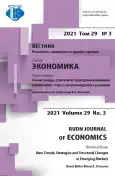The Indian Republic in the global energy markets
- Authors: Gusakov N.P.1, Konovalova Y.A.1, Reshad S.A.1
-
Affiliations:
- Peoples’ Friendship University of Russia (RUDN University)
- Issue: Vol 29, No 3 (2021): New trends, strategies and structural changes in emerging markets
- Pages: 502-509
- Section: INDUSTRIAL ORGANIZATION MARKETS
- URL: https://journal-vniispk.ru/2313-2329/article/view/324207
- DOI: https://doi.org/10.22363/2313-2329-2021-29-3-502-509
- ID: 324207
Cite item
Full Text
Abstract
Energy is an integral part of the economic security of any state, and it is more complex, the lower the degree of provision with its mineral resources and the higher the number of the population living in the country. Being the undisputed world leaders in terms of population (1.4 billion people and 1.3 billion people), China and India are concerned about ensuring the energy security of their national economies. According to the latest forecasts formed by the International Energy Agency, by 2040, these two countries will become world leaders in terms of imports of mineral products (in this case: crude oil and natural gas). China is the world leader in exporting goods; India is implementing an economic and industrial policy to turn the country into a world manufacturing hub. In this regard, providing countries with energy resources is one of the most critical tasks. At the same time, a significant problem is a dependence on regular supplies of raw materials and world prices for energy carriers. Respectively, countries should pursue a policy of diversification of suppliers of mineral products. The subject of this study is the Republic of India and its position in the world energy markets; issues of energy security and energy policy are also highlighted.
Keywords
About the authors
Nikolay P. Gusakov
Peoples’ Friendship University of Russia (RUDN University)
Author for correspondence.
Email: gusakov-np@rudn.ru
Dr. Econ. Sci., Full Professor, Professor of the Department of International Economic Relations
6 Miklukho-Maklaya St, Moscow, 117198, Russian FederationYulia A. Konovalova
Peoples’ Friendship University of Russia (RUDN University)
Email: konovalova-yua@rudn.ru
Candidate of Science (in Economics), the head teacher of the Department of International Economic Relations
6 Miklukho-Maklaya St, Moscow, 117198, Russian FederationSayar Akhmad Reshad
Peoples’ Friendship University of Russia (RUDN University)
Email: sayarakhmad@yandex.ru
PhD student of the first year of education of the Department of International Economic Relations
6 Miklukho-Maklaya St, Moscow, 117198, Russian FederationReferences
- Andronova, I.V., & Gusakov, N.P. (2015). Prospects for the development of the Eurasian Economic Union in the context of external economic security of the Russian Federation. RUDN Journal of Economics, (1), 47-56. (In Russ.)
- Bragina, E.A. (2020). India’s economy under pressure from COVID-19. Outlines of Global Transformations: Politics, Economics, Law, 13(5), 128-144. (In Russ.)
- Galisheva, N.V. (2019). The industrial policy as a driver of the Indian economy’s development. RUDN Journal of Economics, 27(2), 205-222. (In Russ.)
- Galisheva, N.V. (2020). The role of small-scale industries in achieving the sustainable development: The experience of India. MGIMO Review, 13(3), 151-169. (In Russ.)
- Gusakov, N.P., & Konovalova, Yu.A. (2017). The current state and prospects for the Russia-India cooperation in the high technology industries. Credit and Finance, 5(725), 292-308 (In Russ.)
- Konovalova, Yu.A. (2021). India on the international market of pharmaceutical goods: Problems and prospects. Vestnik MIRBIS, 1(25), 170-180. (In Russ.)
- Konovalova, Yu.A., & Valueva, I.A. (2018). Military and technical cooperation of two regional leaders: New challenges for Russia and India. RUDN Journal of Economics, 26(1), 28-37. (In Russ.)
- Malyarov, O.V. (2014). The state sector of India. Moscow. (In Russ.)
- Shaumyan, T.L. (2020). BRICS as an important factor in international relations. New and the Newest History, (1), 247-248. (In Russ.)
Supplementary files









